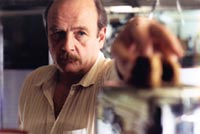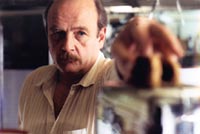Films made by Christians generally seem to fall into two categories. The Passion notwithstanding, you’ve got your overtly Christian-themed “cheesy & preachy” films that are more concerned with sermonizing than good story-telling and good filmmaking. And then there are those films that don’t deal directly with Christian themes but still end up being good entertainment—not altogether a bad thing (see David Taylor’s In Defense of Mere Entertainment).
Rarely, though, does a film unabashedly introduce explicit Christian worldviews, themes, and characters and still manage to wow mainstream audiences. The Least of These, a short film by Rik Swartzwelder, does exactly that. Now available on video after playing at nearly 100 festivals worldwide, and winning over 27 film awards, the movie is an adaptation of true events told by Tony Campolo known as “The Agnes Story.”

Don’t let the term “short film” mislead you. The running time at 20 minutes is about the same as any half-hour TV show or VeggieTales episode. Plus the DVD extras add up to more than 90 minutes of material, including a fascinating interview with Campolo about his real experience that led to the story and the film.
The story is set at an old greasy diner where the regular late-night clientele hangs out: blue-collar retirees, rowdy club-hoppers, lonely drifters, and prostitutes at the end of their shift. Swartzwelder deftly takes us into the diner, giving us time to feel the mood and practically taste the sheer tedium of the characters who seem to live there. You get the feeling it’s the same old, same old—and has been that way for decades. The director’s eye for detail and the use of lighting, music, and camera movement immediately draw you into this place where hopefulness left long ago.

When a new guy, Keith, walks into the place, it’s clear he’s not part of the same crowd. The old geezers poke some fun at him as they wonder who he is and what he’s doing there. Keith is clean-cut and shy, and eventually we learn he’s in town for a Christian conference; he just dropped in for a late-late-night snack. As a trio of prostitutes joins in the bar, Keith overhears that one of them is turning 30 and has never had a birthday cake. Keith shortly afterwards suggests to Jim, the owner of the diner, that they throw her a birthday party the following evening. Jim and the regulars scoff at his preposterous suggestion, but Jim’s wife speaks up and convinces them to do it. Skeptical at first, eventually the whole diner crowd joins in putting up streamers, decorating a cake, blowing up balloons in preparation for the surprise party for the prostitute. I won’t give away the ending, but it’s well worth watching.
The film’s production values are stellar, particularly for a short film, and the investment in 35-mm film, professional actors, and beautiful cinematography work together to tell the story in a compelling manner. Swartzwelder, a young Emmy-winning director, is clearly comfortable at the helm and pays remarkable attention to detail—including clever little Easter Eggs, such as when we see Jim’s wife reading a book: Campolo’s Agnes story.

What makes the film so remarkable is not just its production values, but the fact that the director has so expertly navigated that fine line between sentiment and sentimentality, between a clear Christian message and cheesy propaganda. Frankly it’s the first Christian-themed live action film I have seen that has zero cheese content. Because the film is told honestly and with passion, it is clear that Swartzwelder cares about the acting, the lighting, the set, the mood, and the cinematic tone, which not only isn’t preachy but also avoids the postmodern wishy-washy trying-too-hard-not-too-look-Christian mentality. The Christian hero in the film is portrayed not as sanctimonious, but genuinely and humbly acting out of a radical obedience to a biblical mandate (the film’s title alludes to Matthew 25:40, “…inasmuch as you did it to one of the least of these My brethren, you did it to Me”).
Sure, I have a few minor quibbles with the film, such as the fact that the prostitutes look a little more like nice ladies from the church choir rather than haggard ladies of the night. Overall, though, The Least of These is a moving film worth viewing, if nothing else because it shatters the tired stereotypes of Christianity in films today.
The Least of These like a breath of fresh air, a compelling work that is entertaining and meaningful to our modern culture, compromising on neither quality nor thoughtful theology.
The Least of These can be purchased here.
Jeffrey Travis, a filmmaker in Austin, Texas, is co-founder of Dos Gringos Productions. He has made a number of short films, and is working on developing his first feature film.
Talk About It
Discussion starters- What do you think prompted Keith’s suggestion to throw a birthday party for Shannon? Is Keith’s example one that Christians should generally follow, or is it for special occasions?
- Should Christians, especially men, be hanging out in late-night diners where prostitutes are?
- How do you feel Keith handled the ridicule and questions from the other people in the diner? How does it compare to what you would do?
- Have you ever had a chance to radically follow Jesus’ command to do something for “the least of these”? How did you (or not) follow up on that opportunity?
The Family Corner
For parents to considerThe Least of These is unrated. It contains no objectionable material, and no coarse language. Parents of very young children should be aware that the story does deal with prostitutes, and the word “whores” is used a couple of times..
Photos © Copyright Old Fashioned Pictures
Copyright © 2004 Christianity Today. Click for reprint information.











